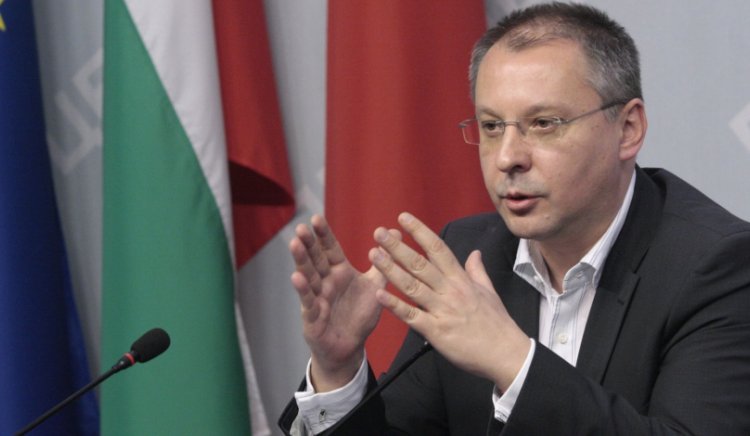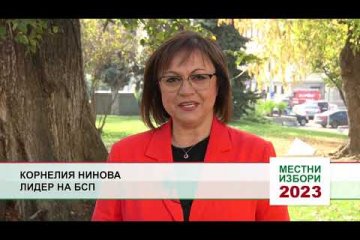БСП е на кръстопът
В ексклузивно интервю за „New Europe" лидерът на БСП Сергей Станишев коментира най- горещите политически теми в България и в ЕС
В ексклузивно интервю за „New Europe" лидерът на БСП Сергей Станишев коментира най- горещите политически теми в България и в ЕС. По повод предстоящия конгрес на БСП той отбелязва, че партията е на кръстопът и предстои да избере дали да се върне назад, или да продължи напред като модерна европейска социалистическа партия с ясни позиции. Важно според Станишев е БСП да предложи алтернатива на настоящото управление, което не води страната в правилна посока. Пред партията стои и задачата да защитава демокрацията в страната, правата на гражданите и свободните и честни избори. Лидерът на БСП изразява безпокойство от разрушаването на принципите на конкуренция в икономиката и деформацията на пазара, които ГЕРБ предизвикват. Тревога според Станишев буди и проблемът със социалното неравенство в страната и орязването на социалните разходи. Председателят на БСП отбеляза, че европейският дебат в България липсва, а той е от изключително значение - например заради предстоящото обсъждане на финансовата рамка на ЕС. По отношение на конфискацията, Станишев коментира, че такова законодателство е необходимо, но предложението на мнозинството в Народното събрание е опасно и противоречи на фундаментални права и принципи. Лидерът на БСП изтъква колко е важно предстоящите парламентарни избори да се проведат свободно. Според него няма как да има демокрация, ако хората не могат да сменят властта без да се страхуват, че ще бъдат наказани заради позицията си.
Следва пълния текст на първата част на интервюто на Сергей Станишев:
Former Bulgarian Prime Minister, and current interim President of the Party of European Socialists (PES), Sergei Stanishev, in the first part of a wide ranging and exclusive interview with New Europe, talks about some of the burning political issues in his home country and the EU alike.
Stanishev reflects on the internal dynamics of his Bulgarian Socialist Party (BSP) ahead of the national party congress in May, pointing out that the candidacy of the former country's president Georgi Parvanov for party leadership, and adds that the BSP is at a crossroads facing two alternatives; going back to the past or seizing the future as a modern European socialist party with clear positions.
According to the former prime minister, BSP policy should be able to offer a clear alternative to the current government as "neither the economy nor the political life" are developing in right direction. He emphasised that "the recent presidential and local elections proved that we [Bulgaria] have very serious problems with the fundamental principle of every European democracy".
According to Stanishev, the BSP needs to defend the democratic balance of power, human rights of citizens, and free and fair elections. In a virtual paraphrase of former US president Reagan, he underlined that "democracy is not something granted once and forever", but that "you have to defend it because there are always attempts to limit it", alluding that the current regime is quite authoritarian in its essence.
The BSP leaders highlighted "deformations in the market economy" accusing the state of "intervening in every sector and creating artificial monopolies and artificial cartels in favour of companies that are close to the government and the governing party, breaking the fundamentals of free and fair competitive economy". He added that the country also faces a serious problem of social inequality as "the last two and a half years the major tool which was used to keep relatively budgetary deficit was just to cut social spendings".
Stanishev stressed the need for Bulgaria to reach the average European level in competitiveness and human development, education, social life, income levels and quality of life. In that respect, he underlined that in Bulgaria, the European institutions are highly reputable, which gives them the possibility to help real reforms which are needed.
He expressed a fear that "in the last three years Bulgaria became more provincial and the European debate particularly disappeared from Bulgarian public life", and underlined that Bulgaria has been severely struggling to rip benefits of its EU membership and that it is in "the 26th place currently in absorption of the structural funds within the European Union".
Stanishev pointed out that the upcoming EU Multiannual financial framework requires Bulgaria to "come out with a clear national position" and stressed readiness "to cooperate with every party, even the governing party" on setting clear national priorities for application of social and cohesion funds.
As the former prime minister, the BSP leader explained that Bulgaria lacked preparedness for absorption of EU funds when the country joined the EU, "because all the efforts were focused on the accession itself, because it was not granted, it was not guaranteed and we needed to prove that we can fulfil fundamental European criteria". He acknowledged it to be a big problem for a country which is in dire need of faster development and blamed politicisation of the administration and bureaucratisations for lack of absorption capacity in Bulgaria.
Stanishev reflected also on the new legislation aimed at fighting corruption and organised crime, which envisages confiscation of assets of suspects without court order. He pointed out that "undoubtedly there are problems in Bulgaria, unfortunately, with the fight against the organised crime and corruption".
He stressed, however, that such a law is needed in Bulgaria, "because many people create enormous wealth through stripping public wealth through many illegal activities", but he emphasised that such a law has to be adopted not in accordance with "fundamental rights and the rule of law and citizens' rights". He criticised the current bill "prepared by the government and voted by the national assembly" as "a dangerous tool" contrary to fundamental rights and rule of law.
Stanishev emphasised that the government in Bulgaria "is controlling civil society and this is an absurd situation". He reflected on the past presidential and local elections and emphasised that "for the first time in twenty two years we have elections which were scandalous". He said that the minister of interior acted as the campaign manager of the governing centre-right GERB party and insinuated he orchestrated techniques of Gerrymandering, which granted victory to the governing party.
He also addressed on 27 March representatives of all parliamentary parties other than the ruling GERB, as well as civil society and NGOs, aiming to ensure common efforts before the next general elections to secure free and fair elections and counting of votes.
"If the society cannot change the power in a free way, without pressure, without fear that someone will be punished for their position, we are not talking about democracy, essentially," he said.




